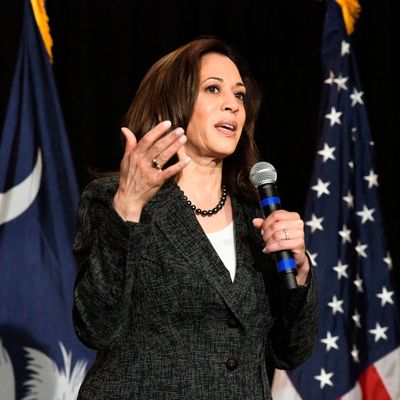
The Iowa caucuses and New Hampshire primary naturally and eternally get the lion’s share of attention as the table-setters in the presidential nominating process. But ever since a bipartisan decision before the 2008 cycle allowed Nevada’s caucuses and South Carolina’s primary into the charmed circle of authorized early contests, they, too, have become quite significant. For Democrats, in particular, South Carolina is the gateway to southern contests in which African-Americans play a dominant role, and is a reasonably reliable leading indicator of where the black vote is trending. In 2008, Barack Obama’s big win in the Palmetto State signaled Hillary Clinton’s loss of a competitive (and at one time, very strong) position among African-Americans, just as her own big win in the same state in 2016 showed her strength in that demographic against Bernie Sanders.
Unsurprisingly, the most discussed early dynamic for South Carolina in 2020 has been the big early lead of Joe Biden, and the Obama-style challenge being posed to his popularity among black voters by not one but two African-American candidates, Kamala Harris and Cory Booker. Both have circled South Carolina on their calendars as crucial states. But until the last few days, sparse polling has made it difficult to determine if they were gaining any ground against Biden.
The big news in a new poll from the Charleston Post-Courier that dropped over the weekend was that the Elizabeth Warren–Pete Buttigieg polling surge had spread to South Carolina, with both candidates now running ahead of Bernie Sanders there (it showed Warren at 17 percent, Mayor Pete at 11 percent, and Sanders at 9 percent, with Biden continuing to lead at a somewhat-reduced 37 percent). But today a CBS/YouGov tracking poll of early states was released that showed Sanders still running second in South Carolina with 18 percent, with Warren third at 8 percent, and Buttigieg fifth at 6 percent.
What both polls showed was that Harris and Booker aren’t making much progress in prying the black vote away from Biden. According to the Post-Courier survey, the former veep has the support of 52 percent of the African-Americans surveyed, with Harris pulling 11 percent, and Booker just 3 percent. The CBS/YouGov survey did not break down individual state results by race or ethnicity, but did show the standing of Biden, Harris, and Booker among African-Americans in the 18 relatively early states it tracked at an eerily similar 50 percent, 11 percent, and 3 percent.
Overall, Harris is doing well enough among white South Carolina voters to come in at 9 percent (tied with Sanders) in the Post-Courier poll and 7 percent in the CBS/YouGov survey. But supporters of Booker have to be concerned at his slow start in South Carolina. The Post-Courier poll has him running well behind Pete Buttigieg among African-Americans in that state (with 6 percent for Buttigieg and 3 percent for Booker), while CBS/YouGov has him tied with Mayor Pete among black voters across the broader early primary landscape. As you may have heard, Buttigieg has struggled to develop much appeal among black voters despite the ever-increasing attention he has been attracting.
Strategically speaking, Harris needs a good showing in South Carolina as a final springboard to the primary in her home state of California, which will arrive just three days after the Palmetto State’s returns hit the news (though many California votes will have already been cast earlier by mail). And Booker is hoping that South Carolina can confirm strength he is expecting to show in Iowa, where his campaign is heavily organized. Both of these candidates would love to squeeze the other out of the nomination contest early on. And both really need to step it up against Biden among black voters, who are the pillars of the front-runner’s support — but potentially his Achilles’ heel.






























